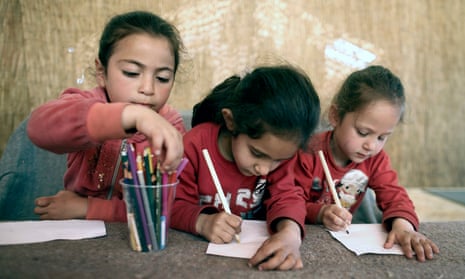When primary schoolteachers Katie McDonald and Vicky Manning arrived to teach in the Faneromeni refugee camp in Greece, they knew they were in for a challenge.
What they were not expecting was that there would be no actual school at all. “I thought there would at least be tents or something,” says Katie, “but there weren’t.”
The site had only been set up in May and there was little by way of infrastructure. The refugees themselves – around 230 Yazidis fleeing genocide in Iraq – were also new arrivals. The two teachers had committed themselves to spending the summer working with refugee children through the charity CalAid. So, lacking a building, they spread tarpaulins on the rocky ground.
“We propped a whiteboard up against a pole while the children sat around on the floor,” says Manning.
“One of the first things the refugees asked for was education,” says CalAid’s programme manager Becky Chapple. So an appeal was launched for teachers to volunteer. Moved by the plight of the refugees, McDonald and Manning put their names forward.
Once in Faneromeni, their first challenge was adapting to the conditions. “Any ideas of using the UK education system were quickly scrapped,” says Manning. “It wasn’t practical, and it wasn’t what they were asking for.”
Love of learning
McDonald and Manning found that they were working with groups of children who were traumatised, but desperate to learn. “They were literally begging me every day for school to start,” says Manning, who had 27 children in her class. “The moment I arrived in camp each day, they would be dragging me out of the car, getting the tarpaulin and the whiteboard out, so we could start as fast as possible.”
But for all of their enthusiasm, the children presented a huge challenge. “I expected them to have been in school and to have recently left, but I was wrong,” says McDonald. “Many of them, even the older ones, had never been to school and had no idea how to learn. “We needed to teach basic behaviour.”
Many were clearly suffering from post-traumatic stress. “Their inability to remember anything was remarkable,” she adds.
Manning was also shocked by the violence with which some of the children would treat each other. “They were really fighting,” she says. “There were incidents in the first days where we weren’t sure how to handle it.”
Those with more experience of working with child refugees say such behaviour is common. In Uganda, for example, aid agencies been working with refugees fleeing the war in neighbouring South Sudan for years. Teachers there are familiar with this combination of trauma, inexperience and eagerness to learn.
‘Great change’
Taban Williams works in one of the schools – supported by the Norwegian Refugee Council – that provides education to South Sudanese children as well as the local community. “We have child soldiers, children who have never been to school, and children with different tribal backgrounds and languages,” he says.
Like many teachers in established refugee camps, Williams is himself a refugee. He says this gives him an advantage: he speaks the same languages, understands ethnic tensions, and can empathise with their struggles.
He has seen the dramatic impact that education can have. Children who ran away from him a year ago, fought in the classroom and could not sit still, now come every day, speak English (the official language of Uganda along with Swahili) and behave well. “I have seen a great change,” he says.
Despite their initial expectations, McDonald and Manning found that they too were making a difference. By the time they left, their little school had a register, a morning assembly, and break times – and it was even running evening classes for adults.
The change in the children was marked. Within weeks, the pair’s initially unruly charges were turning up every day and had mastered basic classroom discipline. “We collected 10 plastic bottles and put them on a wall and they sang 10 Green Bottles,” says Manning.
She is now looking at ways to continue supporting the children. “It made a huge impact – it was an incredible experience. If I could afford to go and teach there for the long term, I would.”
Leaving was hard for the teachers as much as the children. “They were all saying: don’t go!” she recalls.
“I was careful not to get too close to the children because I didn’t want them getting attached,” says McDonald. “But they had so much potential and no one is facilitating that in them. They all want to be doctors and lawyers, and I smiled and encouraged them, but I did think what a long way they have to go.”
Unfortunately, many children have not been able to start school in Greece this September as the Greek government originally planned, so charities need to continue providing these services in the camps.
“We need all kind of teachers,” says CalAid’s Chapple. “There are so many incredibly talented and clever children, and a good teacher can be life-changing for them.”
CalAid is currently recruiting professional teachers and youth workers wishing to volunteer in Greece between now and December. The minimum period to be spent in camp is three weeks. For more information, please contact info@calaid.co.uk

Comments (…)
Sign in or create your Guardian account to join the discussion